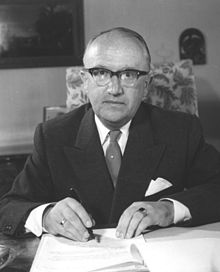
Back والتر هالشتاين Arabic والتر هالشتاين ARZ Walter Hallstein AST ভাল্টার হালষ্টাইন Bengali/Bangla Walter Hallstein Catalan Walter Hallstein Czech Walter Hallstein German Walter Hallstein Spanish Walter Hallstein Estonian Walter Hallstein Basque
Walter Hallstein | |
|---|---|
 Hallstein in 1957 | |
| President of the European Commission | |
| In office 7 January 1958 – 30 June 1967 | |
| First Vice-President | Sicco Mansholt |
| Preceded by | Position established |
| Succeeded by | Jean Rey |
| State Secretary at the Federal Foreign Office | |
| In office 2 April 1951 – 7 January 1958 | |
| Preceded by | Position established |
| Succeeded by | Hilger van Scherpenberg |
| Member of the Bundestag | |
| In office 28 September 1969 – 19 November 1972 | |
| Constituency | Neuwied |
| Personal details | |
| Born | 17 November 1901 Mainz, German Empire |
| Died | 29 March 1982 (aged 80) Stuttgart, West Germany |
| Resting place | Waldfriedhof Cemetery, Stuttgart, Germany |
| Political party | Christian Democratic Union |
| Alma mater | Friedrich Wilhelm University |
| Military service | |
| Allegiance | |
| Branch/service | |
| Years of service | 1942–1945 |
| Rank | Oberleutnant |
| Battles/wars | World War II |
Walter Hallstein (17 November 1901 – 29 March 1982) was a German academic, diplomat and statesman who was the first president of the Commission of the European Economic Community and one of the founding fathers of the European Union.
Hallstein began his academic career in the 1920s Weimar Republic and became Germany's youngest law professor in 1930, at the age of 29. During World War II he served as a First Lieutenant in the German Army in France. Captured by American troops in 1944, he spent the rest of the war in a prisoner-of-war camp in the United States, where he organised a "camp university" for his fellow soldiers. After the war he returned to Germany and continued his academic career; he became rector of the University of Frankfurt in 1946 and spent a year as a visiting professor at Georgetown University from 1948. In 1950 he was recruited to a diplomatic career, becoming the leading civil servant at the German Foreign Office, where he gave his name to the Hallstein Doctrine, West Germany's policy of isolating East Germany diplomatically.
A keen advocate of a federal Europe, Hallstein played a key role in West German foreign policy and then in European integration. He was one of the architects of the European Coal and Steel Community and the first President of the Commission of the European Economic Community, which would later become the European Union. He held the office from 1958 to 1967 and was the only German to be selected as president of the European Commission or its predecessors until the selection of Ursula von der Leyen in 2019.[1] Hallstein famously described his role as "a kind of European prime minister" and dismissed national sovereignty as a "doctrine of yesteryear."[2][3]
Hallstein left office following a clash with the President of France, Charles de Gaulle; he turned to German politics as a member of the Bundestag, also serving as President of the European Movement from 1968 to 1974. He is the author of books and numerous articles and speeches on European integration and on the European Communities.
Cite error: There are <ref group=lower-alpha> tags or {{efn}} templates on this page, but the references will not show without a {{reflist|group=lower-alpha}} template or {{notelist}} template (see the help page).
- ^ Küsters 2011.
- ^ Urwin 1995, p. 103.
- ^ Soetendorp 2014, p. 20.